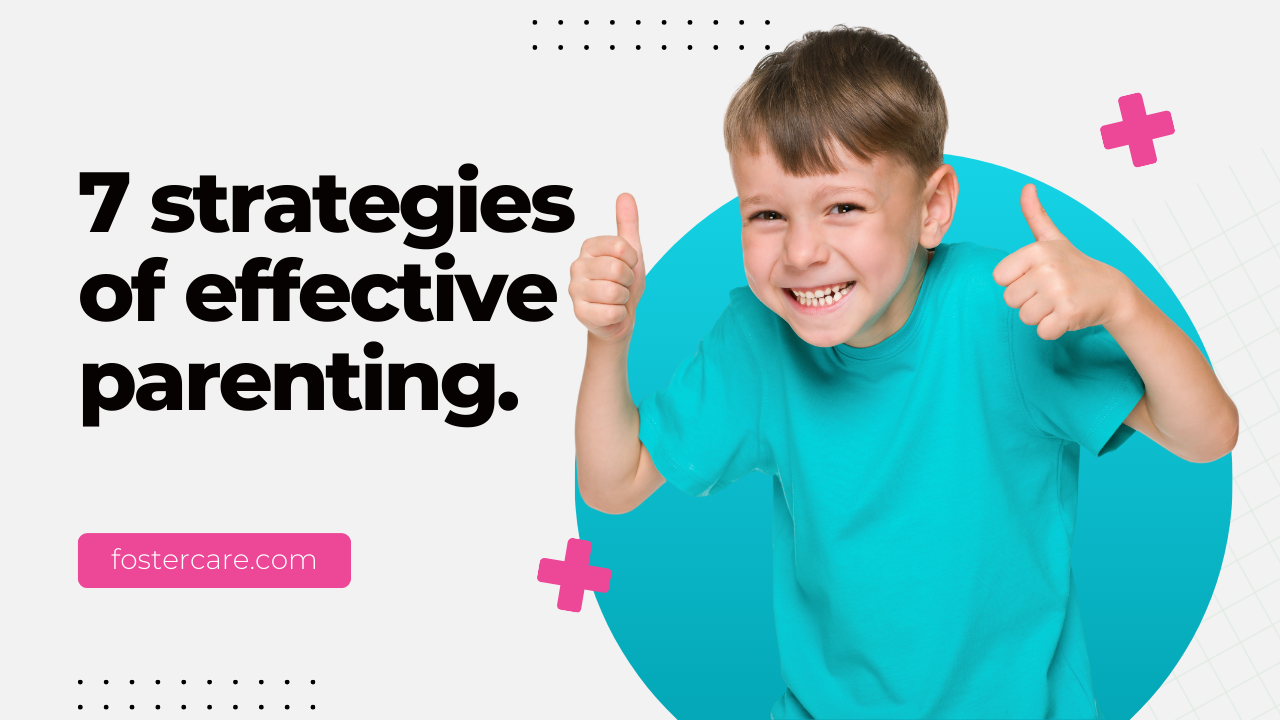
Parenting is one of the most challenging and rewarding roles we can experience. The journey is filled with joy, challenges, learning, and growth, both for the parent and the child. To be effective as parents, we need to adopt certain strategies that promote a nurturing environment, foster healthy communication, and help children grow into independent, responsible adults. Below, we explore seven key strategies of effective parenting that can make a real difference in your family’s life.
1. Be Consistent with Boundaries and Discipline
One of the most crucial aspects of effective parenting is setting consistent boundaries and enforcing discipline in a fair, firm manner. Children thrive when they understand the expectations and limits set by their parents. Consistency helps them feel secure, knowing the consequences of their actions will remain the same, regardless of the situation. Inconsistent boundaries, on the other hand, lead to confusion and often result in behavioral problems.
Key Practices:
- Set clear rules: Make sure your children understand the rules of the house, and what behavior is expected of them.
- Follow through with consequences: If a rule is broken, enforce appropriate and pre-determined consequences.
- Balance firmness with love: Disciplinary actions should always come from a place of care, not frustration.
Consistency in parenting builds a sense of accountability and helps children understand the relationship between actions and consequences.
2. Foster Open and Honest Communication
Effective communication forms the foundation of a strong parent-child relationship. Being open and available to talk to your children encourages them to express their feelings, ask questions, and come to you with problems, knowing that they will be heard without judgment.
Key Practices:
- Listen actively: Show genuine interest in what your children are saying, and avoid interrupting.
- Create a safe space: Ensure your children know they can talk to you about anything without fear of reprimand.
- Model positive communication: Show your children how to handle emotions and difficult conversations through your own behavior.
Open communication builds trust and respect between you and your child, making it easier to navigate challenges together.
3. Encourage Independence and Responsibility
Helping children become independent and responsible is a crucial goal of parenting. By allowing them to make decisions, even small ones, you build their confidence and critical thinking skills. Over time, they learn to manage responsibilities, solve problems on their own, and become more self-reliant.
Key Practices:
- Give age-appropriate tasks: Assigning household chores or responsibilities teaches children how to manage their time and tasks.
- Encourage decision-making: Let children make choices about things that impact them, such as what to wear or how to organize their homework.
- Promote problem-solving: When your child faces a challenge, offer guidance but encourage them to find solutions independently.
Balancing support with the freedom to make mistakes allows children to grow into capable and confident individuals.
4. Show Unconditional Love and Support
Every child needs to feel loved unconditionally. Regardless of their achievements or mistakes, your child should know that your love for them does not waver. This provides a sense of security and fosters emotional well-being.
Key Practices:
- Express affection regularly: Whether it’s through words, hugs, or simply spending time together, showing affection reinforces your bond.
- Celebrate efforts, not just successes: Praise your child for the effort they put into tasks, even if the result isn’t perfect. This reinforces their intrinsic motivation.
- Be there during tough times: When your child is struggling, offering emotional support is crucial. Reassure them that it’s okay to fail, and that they will always have your backing.
Unconditional love is the bedrock of a healthy parent-child relationship and contributes to a child’s emotional stability.
5. Be a Good Role Model
Children learn more from what we do than what we say. Being a positive role model is a powerful way to teach values, good behavior, and habits. If you want your child to exhibit qualities like kindness, responsibility, and integrity, you must embody these traits in your own actions.
Key Practices:
- Show respect and empathy: Treat others with kindness and respect, and your children will learn to do the same.
- Demonstrate a strong work ethic: Your approach to work and responsibilities will shape how your child approaches their own tasks.
- Practice self-care: Children should see you managing stress in healthy ways, like exercising or taking time for yourself. This teaches them the importance of self-care and balance.
Your behavior serves as a constant guide for your child, so leading by example is one of the most effective teaching tools you have.
6. Encourage Healthy Social Relationships
Children need to learn how to interact with others in a healthy and positive manner. As a parent, you can help your child develop social skills by encouraging them to build friendships, work through conflicts constructively, and engage in activities that involve teamwork.
Key Practices:
- Teach empathy: Encourage your child to understand other people’s feelings and perspectives, which builds emotional intelligence.
- Support extracurricular activities: Encourage your child to join clubs, sports teams, or other group activities to foster teamwork and leadership skills.
- Help them navigate conflicts: Instead of solving their disputes for them, guide your child through resolving conflicts on their own. This builds resilience and negotiation skills.
Building strong social skills is essential for a child’s future success in both personal and professional relationships.
7. Stay Involved in Your Child’s Education
Your involvement in your child’s education is critical for their academic success and overall development. Being an active participant shows your child that you value their learning and are there to support them in their educational journey.
Key Practices:
- Create a conducive learning environment: Ensure your home has a quiet, organized space for study.
- Communicate with teachers: Stay in touch with your child’s educators to understand their progress and address any concerns early.
- Encourage a love of learning: Focus on fostering curiosity and a passion for discovery, rather than just grades.
By staying involved and engaged in your child’s education, you help them develop a positive attitude toward learning and success.
Conclusion
Effective parenting requires a combination of consistency, love, communication, and support. By adopting these seven strategies, you can create a nurturing environment that allows your child to thrive. Remember, parenting is a continuous learning process, but the investment you make in your child’s development will pay off in their future success and happiness.


